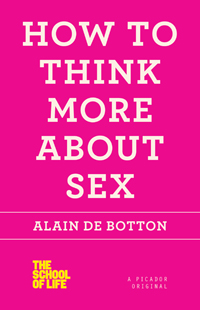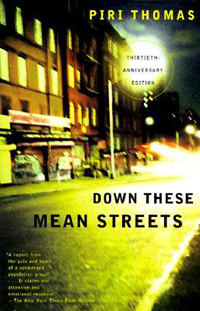How to Think More About Sex
 How to Think More About Sex
How to Think More About Sex
by Alain de Botton
Picador, December 2012
192 pages / $16 Buy from Picador or Amazon
In the middle of Michel Houellebecq’s The Elementary Particles, the narrator makes one of many comparisons between sex and the free market:
While Houellebecq has been derided by some as misogynistic and bleak, it is clear that upon reading Alain de Botton’s How to Think More About Sex, a slim volume that should have been titled How to Think More About Heteronormative Sex, the two would be in agreement about at least one thing: as those with partners age, both in their relationships and biology, individual desire for sex decreases until finally, death. In one of the more interesting sections of the book (the other being on pornography,) one of the first in Picador’s “The School of Life” series, de Botton repudiates the assertion first made by the Masters & Johnson study that states in order for a marriage to be successful, sex should be a constant. Ignoring this trend that was later capitalized upon by sex therapists and then pharmaceutical companies, de Botton argues that a decrease in our sex drive and the quality and quantity of sex is purely normal and is a “necessary comprise of long-term love.”
March 15th, 2013 / 12:00 pm
Why Down These Mean Streets Matters Now More Than Ever
 Down These Mean Streets
Down These Mean Streets
by Piri Thomas
First published 1967, Knopf.
Vintage Edition, 1997
352 pages / $14.95 Buy from Amazon
In the essay “The Simple Art of Murder” for The Atlantic Monthly in 1945, noir author Raymond Chandler wrote “Down these mean streets a man must go who is not himself mean, who is neither tarnished nor afraid.” While Chandler was speaking about detectives in novels, the same could easily be said about youth growing up in inner city neighborhoods. The first person publicly known to make the connection was Knopf editor Angus Cameron, who paraphrased this on a manuscript he was given titled “Home Sweet Harlem” by a man named Piri Thomas. The manuscript, which was published by Knopf in 1967, would become known as Down These Mean Streets.
In May of that year, critic Daniel Stern of The New York Times reviewed the memoir, saying, “It is something of a linguistic event. Gutter language, Spanish imagery and personal poets…mingle into a kind of individual statement that has very much its own sound…” Little did Stern realize that so-called “gutter language” would have such an impact on contemporary literature. Subsequently the novel was later banned in multiple school districts across the country (including District 25 in Queens, New York) on the basis of obscenity.
The ban in Queens was not lifted until five years later, even after it was brought to court by the New York Civil Liberties Union.
Published several years after Claude Brown’s Manchild in the Promised Land, (which unlike Thomas’ memoir is an autobiographical novel) the book was marketed using language akin to the sensationalism of most modern tabloids, as any reader can see on the front and back covers of Signet’s 1968 reprint. Phrases such as “savage power” and “the brutal code of machismo” plainly indicate a widespread culture of ignorance. Thus was the attitude of publishers about works based on the experiences of people of color in 1968. Whether much has changed in the publishing industry’s attitudes about urban literature now is an entirely different discussion.
December 19th, 2012 / 12:00 pm
